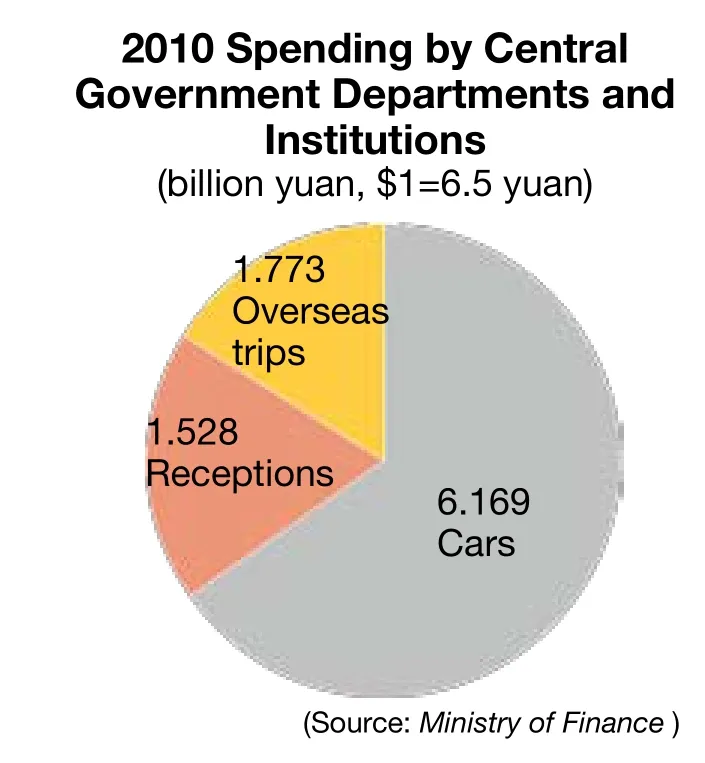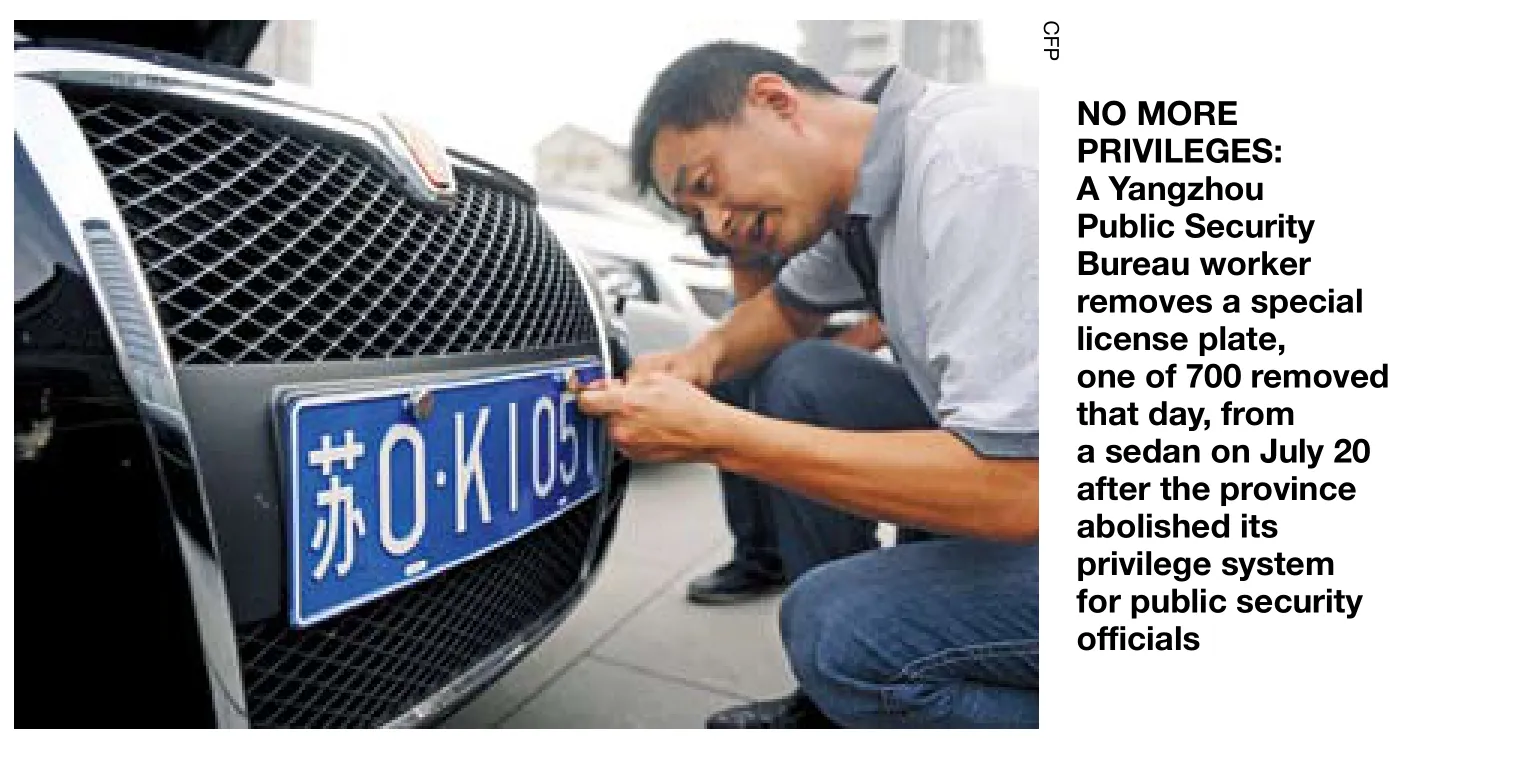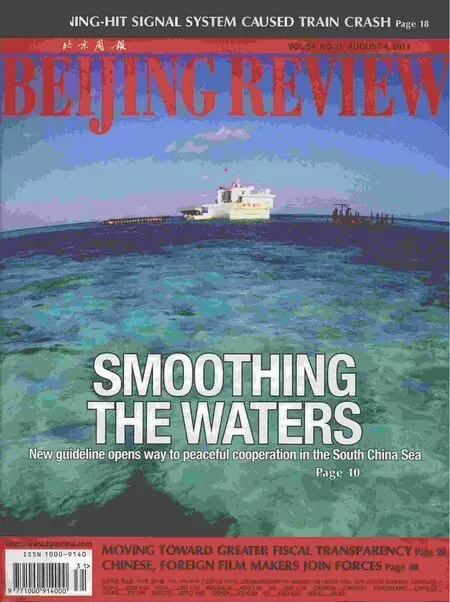Call for Greater Transparency
By LAN XINZHEN
Call for Greater Transparency
By LAN XINZHEN
The Chinese people are demanding government departments disclose detailed budgets of expenses
In an unprecedented move, China’s 98 Central Government departments and pubic institutions in July began disclosing their expenditures for overseas trips, offcial car use and receptions. The disclosures include their actual 2010 spending and 2011 budget as required by the State Council.
“This marks a landmark in promoting China’s administrative transparency and a significant move as China reforms its political system,” said Zhu Lijia, professor of public administration with the Chinese Academy of Governance.
But old practices die hard. The goal of administrative transparency will not be achieved in a few months and the disclosures so far are not as detailed as the public have expected. Still, the fact the Central Government is promoting budget transparency shows China’s determination to push forward political system reform, Zhu said.
Taking the first step
It has been a target of criticism for many years that government departments kept the details of their spending from the public eye.
Zhu wrote an article in 2006, pointing out the corrupt doings of civil servants who use cars purchased by public funds, spend public funds dining and wining, and travel abroad at government expense.
“It will stir up resentment among the people and affect the collective image of the Communist Party if Party and government officials continue to enjoy these kinds of privileges,” he said. “Furthermore, government spending in the aforementioned three categories is usually unchecked. It’s a hotbed for such corrupt practices as squandering and waste, embezzlement and fraud. That’s why they attracted a lot of attention.”
These problems, along with appeals from the public, have prompted the Central Government to work out solutions. China began to implement a regulation on government information disclosure back in May 2008, with focuses on fnancial budgets and financial statements of various government departments, to a par with environment protection, public health, safe production and food and drug quality supervision.
The issue was revisited at the State Council executive meeting chaired by Premier Wen Jiabao in March where the Central Government decided to further reduce the central budget on official cars, receptions and overseas trips. The meeting also instructed the Ministry of Finance to include details of related expenditures by all departments of the Central Government in its June report to the Standing Committee of the National People’s Congress. A system for managing, examining and verifying related funds, and establishing an effective mechanism to promote frugality among government departments will also be set up.
“Most importantly, it was the frst time that the government took the initiative to accept public supervision on its spending,” Zhu said.
The pursuit of spending transparency is a positive step forward to government information disclosure, said Wang Jingbo, professor with the China University of Political Science and Law.
“In making fiscal expenditures public and allowing transparency, the government shows respect to the people’s right to know,” Wang said. “Only when this kind of spending is disclosed properly and timely can the government’s actions come under the public spotlight, helping the government win support and recognition from its people.”
Having open and transparent governments represents a global trend, and China will be no exception, Wang said.
Reluctant to open up
Many a ministry is hesitant to just open up their records for public scrutiny. Although the State Council asked for spending disclosure in June, only a few actually followed through in July.
Some officials cling to the privileges that have brought themselves and their departments many advantages and benefts, while others are not confdent about their problematic accounts and upset about possible queries from the public. They hesitate not because they don’t have related budget reports and financial statements—it more or less hinges on their attitude toward administrative transparency, Wang said.

The already disclosed information is generally ambiguous and unable to be compared without payroll numbers or per-capita expenditure. Also, the absence of proportions of the three-category spending to the whole expenditure and to the fscal allotment makes it impossible to determine whether the spending is high or within a reasonable limit. There are only numbers, not details, on the money spent.
Evasive measures and holding back the actual information will only evoke more dissatisfaction and damage these ministries’ images. Disclosure will ensure effective supervision by the people and promote departmental change and reform, Wang said.
Restraints
An effcient system must be put in place to spur these departments to disclose details of their spending and encourage public supervision and criticism, Zhu said.
Institutional arrangements are also needed for information disclosure and budget approval and verification, such as stipulations on who approves the budgets, who verifes fnancial statements, and how to punish offcials who manipulate or fudge the numbers between departments, he said.
Punishments should also be enforced to deter delays of disclosure, otherwise, the goal of budget transparency will never be achieved, he said.
But disclosure is not the goal; it’s the means to the goal of administrative transparency and preventing privilege-based corruption from spreading, Zhu said.
The disclosure will not only let the people know where their money goes, but will also urge the government to practice thrifty and appropriate use of taxpayers’money, said Deng Yuwen, a senior editor withStudy Timesaffiliated to the Party School of the CPC Central Committee.
“That’s why we have to improve institutional arrangements and disclosure procedures for budget transparency with a focus on accountability,” Deng said.
It’s imperative to establish a constraint system and enforce severe punishment on delays and squandering of public funds, since insuffcient punishment was to blame for previous failures in addressing the problem, Deng said.
Legislation is needed to iron out disclosure methods, allowing delegates to the people’s congress at all levels to examine and approve the budget and work out standards on how detailed the disclosures should be, Deng said.
Improvements need to be made to the current disclosure system, such as budget classification, to avoid the use of “other expenses” in the report, and specifying the disclosure cycle and deadline.
“In doing so, it will prevent delays, defance, or fooling the public with old accounting records,” Deng said.
The budget management system should also be improved by integrating internal and external management systems, prohibiting the practice of having private coffers at local governments or government departments, Deng said.
第三天,张秋发现张贴在北山3棵树上的启事被揭下来了。王敬凯分析,这不是放牛人所为,也不是无意人所为。王敬凯又指示张秋,继续张贴启事。
Budgets at all levels and special funds should be included in management budgets and made public. This would include problematic items identifed during the annual auditing to allow public supervision, he said.
“The people’s congress at all levels should reinforce examining and supervision efforts, allowing auditing independence, and that’s why we need a budget law and an auditing law as soon as possible to enforce necessary punishments,” Deng said.
“Overall, we need strict stipulations, practical measures and effective mechanisms to ensure the people’s rights to know, to participate in and to watch the disclosure on government spending,” Deng said.

Top Spending Disclosures
Earliest and simplest disclosure: The Ministry of Science and Technology disclosed its 2011 three-category budget on April 14, 2011, which is the earliest among Central Government departments and institutions. The statement was short, only one sentence long, and said that its 2011 budget stands at 40.19 million yuan ($6.18 million).
Most detailed disclosure: The National Audit Office of China disclosed its 2010 spending and 2011 budget on July 11. The 1,000-word explanation and an accompanying table showed it spent 6.17 million yuan ($949,231) on overseas business trips last year, with per-capita expenses close to 16,800 yuan ($2,585), and 11.15 million yuan ($1.7 million) on vehicle maintenance, or 54,100 yuan ($8,323) for each vehicle.
Largest budget decrease: The Chinese Academy of Sciences posted the largest year-on-year decrease in its 2011 budget, 43.6 million yuan ($6.71 million), on July 8.
Largest budget increase: The General Administration of Sport of China announced the largest year-on-year increase in its 2011 budget, 14.76 million yuan ($2.27 million), on July 20.
(Compiled byBeijing Review)


